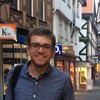Still from 'Stalker' (1979) by Andrei Tarkovsky
Advertisement
So it goes with Arsenal's Tarkovsky retrospective, which receives minimal advertising and as far as I know doesn't even have a special name, and which is nevertheless a time-bending tradition of its own, especially for Berlin, a city that sometimes seems allergic to its own past. Berlin looks forward, the thinking goes, always in the process of becoming, never of being or reflecting. Yet the retrospective is perennially popular. "Tarkovsky's back at Arsenal—it must be August," Berliners are known to quip (or so I'm told). International filmgoers book their flights as soon as the schedule is released, some in order to see the same set of films they saw last year. Judging from my seatmates at several screenings, the appeal crosses generational as well as national divides. The people want Tarkovsky, they want him on celluloid, and they want him whole: the complete and unabridged oeuvre.Related; Alan Smithee Is Officially the Worst Hollywood Director of All Time
Advertisement
Advertisement
Advertisement
Advertisement
Solaris is Tarkovsky's most famous film—particularly now, thanks to the Soderbergh update—and it was by far the most crowded screening I attended at the festival. Adapting a Stanislaw Lem novel, Tarkovsky found himself filming inside a gritty, disused space station set that looked like something out of Star Wars, and as a result the film, which is often billed as "the Soviet response to 2001," was the director's least favorite. But the power of its central narrative of memory and desire (featuring a dead wife's eternal and uncanny return to her husband) is undiminished, even if the sets have aged. At the end of the screening, I noticed an old woman in the theater wearing an exact copy of the wife's iconic shawl.With the autobiographical Mirror, Tarkovsky leaped into new cinematic space-time, leaving many fans behind. In Sculpting in Time he recalls the incensed letters he received from filmgoers after its release, and quotes from them liberally: "Half an hour ago I came out of Mirror. Well!!… Comrade director! Have you seen it? I think there's something unhealthy about it…" Mirror is a montage-like assemblage of moments from the director's childhood, interspersed with scenes of adult life and his father's poetry—all of it astonishing. Not a single frame is out of place. It's one of those films for which you thank the Soviet powers that be for its creation, a film whose commercial prospects were nonexistent, a film—according to conventional wisdom—Hollywood could never have produced.
Advertisement
Mirror's follow-up, Stalker, is if anything less accessible, although it's a great brooding road movie of the soul, The Wizard of Oz as written by Samuel Beckett and filtered through woozy Kodachrome. The plot, however, is thin: In a distant country, a meteorite has created a forbidden area of uncertain dangers, the innermost sanctum of which zone is reported to grant any visitors their deepest desires. Three men go to visit. Yet within this undercooked premise the film manages to produce moments of purest cinematic wonder.All of Tarkovsky's films—excepting the last two, Nostalgia and particularly The Sacrifice, which even I have to admit muddles through a lot of forgettable spiritual pabulum before its conflagration of a finale—are basically free of cliché or convention. Each proceeds as though it were the very first work in a newfound genre, a celluloid Upanishad or Pilgrim's Progress. Watching all of them over a period of a month proved to be a pretty grueling experience, not because the films aren't brilliant and world-blossoming, but precisely because they are, and because they test your deadened heuristics of sensibility so exhaustively. And they resist the sort of sense-making a quickie review like this ought to provide. If Tarkovsky does lean on any stylistic tic or predilection, it is probably the long and virtuosic single-shot scenes at the very ends of his last five films— Solaris, Mirror, Stalker, Nostalgia, and The Sacrifice—all of which present some irreducible image to simultaneously fill the mind with beauty and empty it of whatever interpretive gloss you may have hoped to leave the theater with. After each screening I reemerged into the throngs of tourists at Potsdamer Platz without much to show for my effort, only the memory of time spent in various zones of exclusion from the familiar and banal.For information on the Tarkovsky Retrospective at Arsenal in Berlin, click here.Follow Ben Mauk on Twitter.
